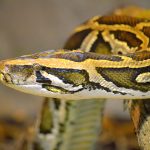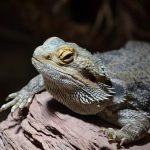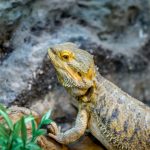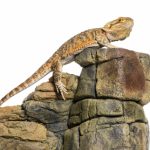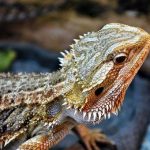Baby dragons will need to be fed more frequently than older beardies because they require more frequent feedings. But the most important for both baby beardies and adult beardies is a varied diet also remember to have a water bowl of clean water that is changed on a daily basis.
Bearded dragons (pogona vitticeps) should be fed once a day when they are adults. Bearded Dragons are able to consume a wide variety of foods, including live prey like crickets, mealworms, and king worms, vegetables like sweet potatoes and bell peppers; and leafy greens like kale and parsley. They are also permitted to consume a restricted amount of fruit.
The list of foods that they are permitted to consume, can include meat, vegetables, fruits, and even weeds. But In the wild, bearded dragons get the majority of their nutrition from animals. In fact, animals make up about 75 percent of their diet.
These animals can be anything from crickets and cockroaches to worms and even small rodents like mice. However, bearded dragons that are kept as pets are not given big mice to eat, but sometimes small pinkies. The remaining 20-25 percent of their diet is made up of a small amount of fruit, leafy greens, and other vegetables.

The Best Live Food for Bearded Dragons
Bearded dragons are one of the most popular reptiles to keep as pets. They are native to Australia and require a warm, arid environment. A diet of live food is essential for these reptiles, and there are a few different options to choose from.
A popular choice for live food is crickets. Crickets are a good source of protein and can be found at most pet stores. Bearded dragons usually prefer small to medium-sized crickets. Another option is waxworms. These are high in fat and should only be fed to bearded dragons occasionally as a treat. Mealworms are also an option, but they should be fed in moderation as they are high in chitin which can cause impaction if eaten in large quantities.
Best Live Food to Feed Bearded Dragons to Gain Protein
Bearded dragons are a type of lizard that originates from Australia. They are popular pets because of their friendly nature and the fact that they can be easily trained. Bearded dragons require a diet high in protein in order to maintain their health and grow properly.
There are a variety of live foods that can be fed to bearded dragons in order to provide them with the necessary protein. Some of the best live foods to feed bearded dragons include
- Crickets
- Mealworms
- Superworms
- Wax worms
- Dubia roaches
This list of the most common bugs is not the only insect you can feed your pet dragon.
Feeding bearded dragons live food is the best option to provide them with the protein that they need.
Crickets are one of the most popular food items for bearded dragons. They are relatively easy to find and purchase, and they provide a good source of protein for your pet lizard. Mealworms are another good option for feeding your bearded dragon. These worms are slightly larger than crickets and can provide your pet with a little more protein. Waxworms and super worms are great live foods to feed bearded dragons, but they may be harder to find. These worms provide a high amount of protein and are more nutritious than crickets.
The best feeder insects for bearded dragons are a combination of crickets, waxworms, and mealworms.
Do bearded dragons have to eat live food?
Yes, they do, no matter how old they are, bearded dragons require a portion of their diet to be composed of live insects. Adult dragons require only 20% of their diet to be made up of live protein, whereas younger bearded dragons require 80% of their diet to be made up of live protein; your dragon will never stop needing to eat live bugs. The nutritional value of dead insects is only a fraction of that of their living counterparts.
What can I feed my bearded dragon instead of live insects?
Bearded dragons consume live prey, but they are also able to subsist on a diet of plants. In terms of other animals, the majority of their diet consists of insects, just like that of other lizards. In general, they are not selective eaters and will consume any insect that they deem to be edible.
They possess a powerful upper jaw as well as a powerful lower jaw. Because of this, they are able to crush beetles and other insects with tough exoskeletons with relative ease. Worms, cockroaches, and other insects make up the remainder of the dragons’ diet. For food, it is possible for an adult dragon to consume rodents such as mice and rats.
Even though they are not cannibals, bearded dragons have been known to consume other dragons in extremely unusual circumstances. They have a strong sense of territoriality and will frequently engage in combat with one another. However, devouring another dragon is an extremely rare occurrence. In terms of foraging for food, it primarily consumes flowers and leaves when it is out in the wild. They will gladly consume fresh fruits and vegetables whenever they come across them.
Bearded dragons that are kept as pets can be fed a wider variety of foods. They are able to eat a limited quantity of ground beef, chicken breast, and even fish (although not recommended).
In terms of vegetables, you can include sweet potato, broccoli, turnip, parsley, and cabbage in its diet. In addition to that, it is able to consume fruits such as apples, bananas, grapes, and strawberries, all of which are typically difficult for it to find in the wild.
What fresh vegetables Do Bearded Dragons Eat?
There is a wide variety of vegetables that bearded dragons can eat. Some of the most common vegetables include: collard greens, turnip greens, mustard greens, kale, and carrots. These vegetables should be chopped into small pieces so that the bearded dragon can easily eat them.
It is important to offer a variety of different vegetables to your bearded dragon so that it can get all the nutrients they need. Bearded dragons are omnivores so there is no specific vegetable that they must eat. It is generally a good idea to feed your bearded dragon vegetables that have dark green or red colors because these vegetables usually have the most nutrients.
Do Bearded Dragons Like Leafy Greens?
Bearded dragons like to eat leafy greens but they will not eat as much of them as they would like other vegetables.
How long can a bearded dragon without eating live food?
A typical bearded dragon can survive in the wild without food for one to three months on average. Because young bearded dragons don’t have enough fat, it’s unlikely that they will live as long as adults.
Can my bearded dragon eat dead insects?
No. The nutritional value of dead insects is only a fraction of that of their living counterparts. When an insect is alive, the majority of its body is composed of water. This water is what stores the vast majority of the nutrients that are found within the insect.
They begin to lose this water and the nutrients that were contained within it as soon as they begin the process of dying, which results in the majority of the nutritional value is lost. Additionally, bearded dragons are avid hunters.
They will no longer feel the need to hunt for their food if they are provided with this stimulating activity, which is also an excellent form of exercise for them to participate in. Because of this, they become sluggish and always expect to be hand-fed or have the food placed in front of them rather than having to hunt for it themselves. If you try to feed them live insects once more, they might stop trying to catch them and instead just let them run away.
Top three ways to feed live insects
- One by One
Putting live insects in your bearded dragon’s tank one at a time using tweezers or a small pair of tongs is an effective method for providing your bearded dragon with food, despite the fact that this method may appear inconvenient.
This method is especially helpful when it comes to feeding baby bearded dragons, who may not be quick enough to chase and attack multiple live preys before they escape and hide in the tank’s fixtures or bury themselves in the substrate. This method allows for a more manageable feeding experience.
In addition to this, a young child may become overeager when presented with a large number of insects all at once, which may result in excessive eating. This presents a problem due to the ease with which infants can gain excessive weight.
- Free for All
Adult dragons or older juvie dragons can benefit from having all of the bugs released into the tank at once. It is most effective in terrariums that are lined with a special reptile carpet or another alternative to a substrate. This is because live prey, especially worms, may bury themselves before they are caught, putting your dragon at risk of eating the harmful stuff along with the good stuff. This is why it is most effective in terrariums that are lined with a special reptile carpet or another alternative to substrate.
- Feeding Dish
Another option is to create a salad for your pet by placing a few insects at a time into a feeding dish that is already full of vegetables. This will give the salad a protein boost. Because bearded dragons are notorious for their ravenous appetites and rapid eating speeds, this is an excellent method for controlling the amount of food they consume without having to put the insects in one at a time. This tactic is especially useful with juvenile dragons, as they are still learning the ropes of hunting at this point in their lives.
Do Bearded Dragons need a calcium powder supplement?
Yes, bearded dragons need a calcium supplement. Without a proper diet, bearded dragons are more likely to get a metabolic bone disease and have problems with their skeleton. Bearded dragon food must be given daily in order to avoid malnutrition.
Do Bearded Dragons need a vitamin D 3 supplement?
Bearded dragons need vitamin D3 as much as they need calcium powder. This is because the UVB rays in sunlight are used to produce vitamin D3. Without this supplement, you can’t grow healthy bones for your bearded dragon.
Can I Feed My Bearded Dragon Frozen Blueberries If It Only Eats Live Food?
Bearded dragons and blueberries: a guide. While bearded dragons are primarily insectivores, it is possible to supplement their diet with small amounts of fruits like blueberries. However, it is crucial to remember that these should not replace their primary diet of live food. Blueberries can be served frozen as a tasty, occasional treat, but moderation is key to avoid digestive issues in your bearded dragon.
Do Bearded Dragons need a vitamin C supplement?
Yes, Cold-blooded animals do not create their own vitamin C. They need to get it from the food they eat. Vitamin C is important for your bearded dragon’s immune system and other functions in the body.

